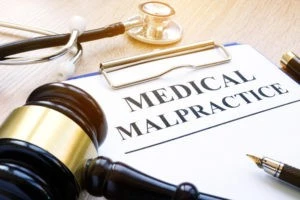
Proving medical malpractice involves showing that the medical professionals in question violated the duty of care they owed you. Once your attorney can establish on your behalf that your doctors failed to meet this reasonable expectation of safety, a link between their negligent actions and the injuries that ultimately led to your pain and suffering must then be established.
When asking, “How do you prove medical malpractice?” there are many pieces of evidence that you will want to gather to support your case, including:
- Medical records
- Details about prior complaints against the offenders
- The opinions and testimony of experts
- Photo or video evidence of your injuries
- Documents pertaining to past malpractice claims against the alleged offenders
- Different Types of Medical Malpractice
- Liability in Medical Malpractice Cases
- Medical Malpractice Lawyers Fight for Victims in New York State
- Contact Friedman & Simon, L.L.P. Today
Different Types of Medical Malpractice
Medical malpractice can take different forms in victims. Examples of medical malpractice cases can include:
- Overprescribing, under-prescribing, or otherwise incorrectly administering dangerous medications
- Causing premature birth or allowing a premature birth to happen when it was preventable
- Not adequately warning patients about the risks associated with certain procedures or medications
- Failure to provide appropriate medical treatment
- Causing infections to occur after treating wounds or performing surgeries
- Medical malpractice in a nursing home setting, which may also involve nursing home abuse, which may include neglect, physical abuse, and mental abuse
- Failing to make a medical diagnosis promptly, or making an incorrect diagnosis
- Mistakes made during surgery
- Injuries that occur during pregnancy or labor
Types of Injuries That Can Occur From Medical Malpractice
The injuries associated with medical malpractice will vary between victims. Common injuries can include, but may not be limited to:
- Birth injuries, which can lead to serious complications like cerebral palsy, breathing conditions, head injuries, nerve damage, and broken bones in newborns
- The progression of a disease, syndrome, or adverse condition to an advanced and more difficult to treat state when earlier detection should have been made while likely more effective treatment could have been administered
- Traumatic brain injuries (TBI)
- Broken bones
- Infections
- Overdoses or adverse reactions from administering dangerous medications
- Bodily harm from unnecessary or improperly performed surgeries
- Tears in the perineum, pelvic area, or birth canal during delivery
- Spinal cord injuries
When it comes to misdiagnosing in medical malpractice cases, one issue concerning the legal community is non-Hodgkin Lymphoma associated to Roundup exposure. NHL symptoms are mistaken with those of influenza, Hodgkin’s lymphoma, and other illnesses. As our Roundup cancer attorneys Long Island could tell you, misdiagnosed NHL patients suffer twice. First, they do not get timely and appropriate treatments for their cancer, which leads to the progression of the disease. Secondly, they miss the statute of limitations in Roundup cancer lawsuit, thus forfeiting whatever compensation they might have been awarded by a jury. If you are in such a situation, you should consult with one of our medical malpractice attorneys and Roundup lawyers to understand your options.
For a free legal consultation, call 516-932-0400
Liability in Medical Malpractice Cases
When a patient takes legal action against the negligent parties in a medical malpractice case, many different entities can be liable. These offenders can be individual medical practitioners, as well as the companies who employ them—like hospitals, medical practices, and urgent care facilities. The following are a few additional examples of liable parties in medical malpractice cases:
- Physicians
- Nurses—both registered nurses (RNs) and licensed practical nurses (LPNs)
- Nurse practitioners
- Surgeons, including oral surgeons, brain surgeons
- Medical testing technicians
- Testing laboratories
- Nursing home and respite care workers
- Anesthesiologists
- Pharmacists
- Dentists
- Psychologists, psychiatrists, and other mental health professionals
In accordance with New York Civil Practice Laws & Rules (CVP) §1411, you can still be eligible for compensation even if the court finds you partially at-fault for your injuries. A medical malpractice attorney can help you navigate laws like this as they pertain to your case.
Medical Malpractice Lawyers Fight for Victims in New York State
Here at Friedman & Simon, L.L.P., we are ready and able to represent victims of medical malpractice all over the State of New York. As our attorneys fight for you, we are committed to providing you with excellent service in numerous ways, including:
- Providing updates on the progression of your medical malpractice claim.
- Working to identify the liable parties.
- Communicating with the other parties involved in your case.
- Gathering evidence on your behalf.
- Assigning a value to your case based on legal precedents, state laws, and the extent of your pain and suffering.
If we take your case to court, we can call upon expert witnesses to examine your case and testify about their findings. These individuals can help us to assign a more appropriate value to your case, while also providing information to assist in our quest to determine liability. These expert witnesses may include:
- Economists
- Vocational rehabilitation experts
- Lifecare planners
- Medical experts
Click to contact our personal injury lawyers today
Contact Friedman & Simon, L.L.P. Today
To better serve you, we work with clients in multiple languages, and we will be happy to meet with you anywhere on Long Island or in the New York metropolitan area.
You should know that there is a finite time to file these types of claims in New York State, as per CVP §214. If you ignore these time limits, the court will dismiss your case.
To get started with your free consultation today, contact a Friedman & Simon, L.L.P. representative at (516) 932-0400.
Call or text 516-932-0400 or complete a Free Case Evaluation form
